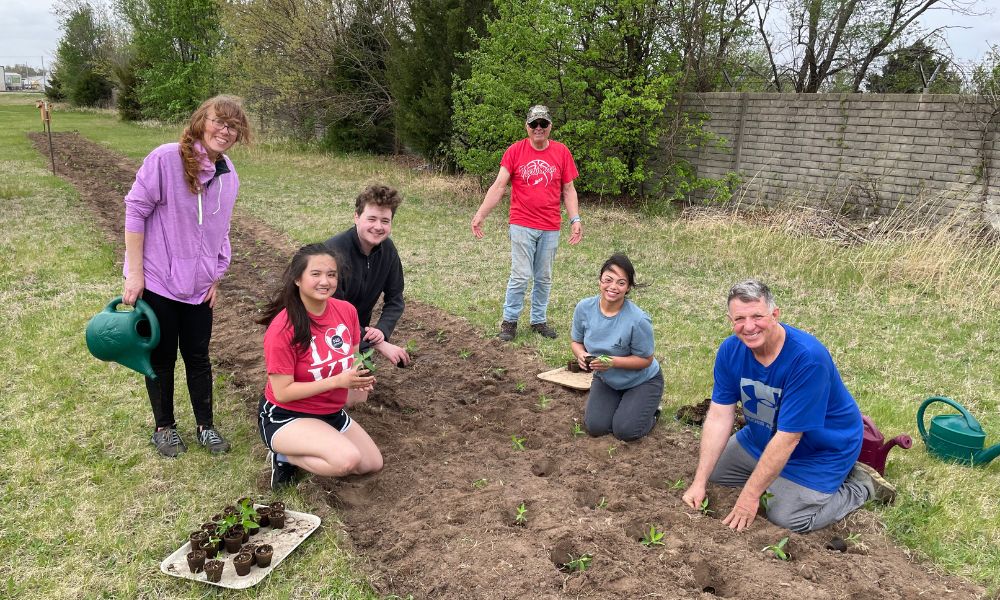Written by: Carmaine Ternes
Campus recycling efforts, eco-friendly service projects and classroom assignments are just a few of the many ways Newman prioritizes healthy environmental practices for students, faculty and staff.
Read on for a reflection on Newman community members’ earthly efforts, written by Kansas Leadership Center volunteer Carmaine Ternes.
Jump to:
- Praise to Sister Therese Wetta for devoted Earth care
- Dynamic Dinh
- Cassie’s challenge
- Amazing Angelica recycling Rodriguez
- Oberley’s “Odyssey of the Mind”
- Jenny’s journey
- Earthly Emerson’s engagement
- Jubilant Jets soar
- Get to know the author
Praise to Sister Therese Wetta for devoted Earth care
Sister Therese Wetta, director of mission effectiveness, lives a remarkable life, professing her vows, receiving a bachelor’s degree in natural sciences from Sacred Heart College, earning a master’s degree in biology from K-State University and completing a doctorate in instructional leadership at Boston College.
Her pilgrimage has positively impacted Newman University’s accomplishments, student engagement, faculty support and staff commitment. Although she is humble about her accolades, Wetta remains a constant driver refusing to waste time and valuable resources. Her commitment to the Newman University family is demonstrated in adherence to its code of ethics, core values, mission and vision.
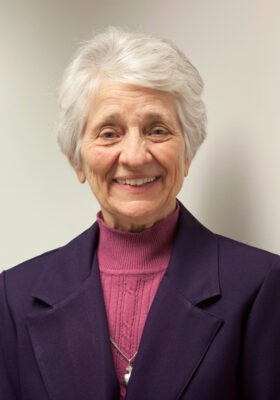
In a recent interview, Wetta provided the Catholic Church’s monumental position on the care of the earth. “Laudato Si’: On Care of Our Common Home” is an encyclical letter promulgated by Pope Francis in 2015. In Nov. 2021, the Dicastery for the Promotion of Integral Human Development in the Vatican, officially launched the seven-year Laudato Si’ Action Platform, a unique collaboration between the Vatican, an international coalition of Catholic organizations and “all men and women of good will.” Educational institutions are among the entities asked to support this effort across the world.
Wetta appreciates, “The USA Association of Catholic Colleges and Universities (ACCU), of which Newman is a member, joining this seven-year effort. On Oct. 8, 2021, the members of the Newman Board of Trustees approved Newman’s participation in the Laudato Si’ Action Platform. Kathleen Jagger, Newman president, signed the official document of commitment on Oct. 29. The offices of Campus Ministry and Mission Effectiveness were charged with beginning the implementation process.”
A culture of respect for the whole person to develop academically and holistically contributes to “Care of God’s Creation, one of the principles or themes of Catholic Social Teaching. This principle is part of the Catholic Intellectual Tradition; thus, participation in the platform is one expression of Newman’s Catholic heritage and identity. … A committee of faculty, staff, and students was established, and seven meetings were held during the semester. The first tasks were to study the encyclical and to learn best practices on campus.”
Crediting the students, faculty, grounds crews, housekeeping, cafeteria, and other staff members as self-starters, Sister Wetta’s sustainable journey steers them and connects resources implementing strategic sustainability actions. This committee researched previous practices of recycling aluminum, plastics, paper, etc., and prepared and implemented a week of activities for Earth Week, including International Earth Day, and will celebrate Earth Week again this year.
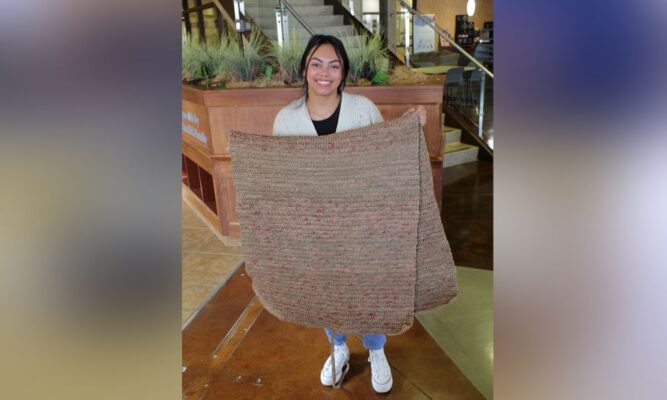
Although this technical challenge provides clear direction, the adaptive challenge requires motivating people to champion campus recycling. Being stewards of faith and the land, creates and strengthens relationships rather than being consumed by the “weight of waste.” The culture to “render the former obsolete” and convert today’s youth advancing realistically rejuvenates and attracts more young people to joyfully participate in campus activities. This impressive journey towards “full sustainability in the holistic spirit of integral ecology” demonstrates a commitment to preservation and conservation. “Food for the soul and sustenance is truly a gift from God.”
Praise to Wetta for exploring, leading, navigating and migrating responsible recycling. As a trailblazer and messenger of hope, students have grown responsibly and spiritually committed to conscious choices repurposing and creative upcycling initiatives.
Dynamic Dinh
As the current president of Circle K International Newman chapter, vice-president of the Asian Student Association, and senator for the Newman Student Government Association, Ashley Dinh is pursuing a Bachelor of Science Degree in biology with a pre-medicine concentration and a minor in accounting.
Ambitious, knowledgeable and responsible describe members of Circle K who serve as community recyclers. A local Kiwanis International Club awarded funding to re-introduce recycling on campus, since limited recycling occurred during the pandemic. Along with the help of the Laudato Si committee, a reasonably priced recycling service was secured, and financial support for continued recycling has been bestowed.
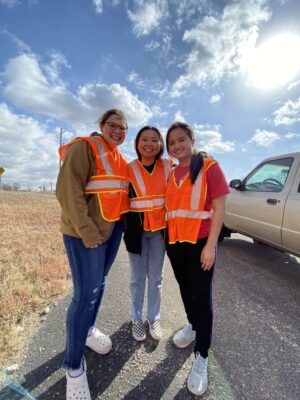
Commitment from the Circle K International Newman Chapter and the Laudato Si Committee promise sustainable projects, despite expensive contamination fees. Signage was designed and posted next to recycling bins promoting an environmentally friendly and healthy environment.
“Sister Therese Wetta deserves praise for environmental efficiency because she started sustainable projects on campus. She really helped me get recycling on campus,” Dinh said.
Wetta collaborated with maintenance for a Newman University recycling service. As leader of the Laudato Si Committee, she champions responsible behavior and mobilizes ecological and organic ecosystems.
Dinh’s vision for Newman’s future is to be the top environmental campus in the area and to create more opportunities for students, faculty, and staff to unite creating a more natural campus.
Cassie’s challenge
Inspired by professor Alan Oberley’s Navigator class, Cassie Moeder created posters and an infomercial drawing attention to recycle bins and acceptable recycling practices. After picking up trash along the Arkansas River in downtown Wichita, Moeder conducted a science experiment identifying the most common trash category, then proposed solutions, and presented her findings to her class.
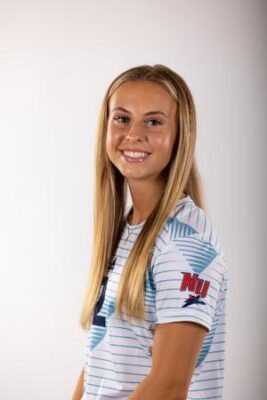
In her fourth year at Newman University, Moeder will complete her biology degree with a concentration in pre-med. Her interest in nutrition and human health, involvement in the Honors Program, honors council, women’s soccer and the Newman University Medical Professionals’ Club (NUMPC) demonstrates her commitment to campus organizations, which serve as a second family. Moeder expressed gratitude for being able to count on fellow members for anything.
Protecting the planet by recycling and repurposing is evident in class projects, campus recycling, trash collection and teamwork. Despite the challenges of educating students, faculty and staff and encouraging responsible recycling, Moeder believes, “I know these efforts will continue after I graduate because it is habit now. I learned what needs to be recycled and what doesn’t.”
The rewards of Newman University’s sustainability coalition, informing individuals what belongs/doesn’t belong in the recycling bins went quite a long way.”
Oberley deserves praise for his efforts enriching class with environmental awareness. His cause/effect scenarios inspire thought and wonder resulting in exploration and problem-solving strategies. According to Moeder, “environmental appreciation should be more evident in other classes, because ecological information deserves more allegiance.”
Moeder’s posts on Instagram and other social media platforms promote the importance of taking care of our Earth and challenge others to be more purposeful. She and her friends walk a nature trail and pick up and recycle trash on Earth Day and throughout the year. As a volunteer at the Kansas Humane Society and various soccer camps and experience as a Traditions & Transitions facilitator, Moeder hopes her actions galvanize people to take action.
Amazing Angelica recycling Rodriguez
As a member of the Newman University Medical Professionals Club (NUMPC) and the Multicultural Leadership Organization (MCLO), Angelica Rodriguez is also a teaching facilitator and part of the impactful recycling project beautifying campus.
Currently a sophomore seeking a degree in biology (pre-med) with a double minor in psychology and Spanish, Rodriguez participated in an Earth Week project last year and created a video raising awareness about what can and cannot be recycled. Her contributions to this service learning project included scenes of people attempting to recycle something that was not intended to be reconditioned, while others modeled appropriate recycling practices. The purpose of this short video was to discern recyclable items and educate others. Published on Newman University’s social media platforms, this film inspired posters that are displayed above the recycling bins.
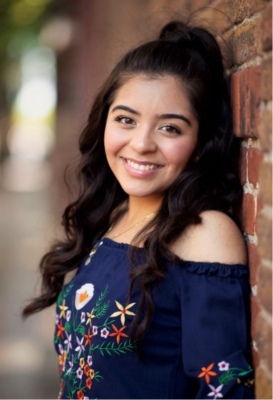
Newman paired recycling bins around the campus. One of the containers is solely for paper products, while the other bin can be used for aluminum cans, plastic, etc. Conveniently located and visibly identified these receptacles inform students and faculty which items may be recycled. Since a few items, such as styrofoam, can completely spoil a batch of recyclable materials, this significant signage resulted in responsible behaviors reducing waste and contamination plus increasing recycling.
Rodriguez believes, “This project was very important, because it seems as if our Earth is becoming an unsafe environment due to global warming, the lack of recycling, the excessive use of plastic and other harmful materials. … My hope is that our Public Service Announcement encourages others to protect our planet. … Some of the greatest challenges are our careless mistakes. For our convenience, we may use the recycling bins as trash cans and discard materials that do not belong in the recycling bins. If we are more vigilant about what we place in the recycling bins, our campus and our environment will improve significantly.”
The tremendous rewards of contributing to a greener campus will benefit us for generations. “When an academic institution participates in the act of recycling, the future of promise is achievable.”
Oberley deserves praise for making this important movement in our campus. Custodial supervisor Scott Stardy and the maintenance crew should be applauded for their ongoing efforts.
As Earth Week approaches, Rodriguez hopes to reinforce the service learning mission from last year and encourage more students, faculty, and staff to improve campus which will contribute to making our environment a much better place. “There are things we learn every day…If we fail to educate others on the importance of recycling, change in our environment will fail to take place.”
Oberley’s “Odyssey of the Mind”
Chemistry Professor Alan Oberley, lab and EPA audit coordinator for the Division of Science Mathematics, discussed rights versus responsibilities. Indeed, we have rights; nonetheless, we should behave responsibly.
“Ownership should be synonymous with stewardship. We should be responsible for our actions. Every choice we make results in a consequence,” Oberley said.
Oberley challenges students to think beyond a textbook and apply theories to real world situations.
Whether Oberley is teaching, co-teaching, mentoring, researching or preparing for labs and classes, his students are expected to examine, explore and inquire — not merely memorize facts. For example, their sense of wonder to protect the environment and learn to prevent and care for toxic waste is critical. Students should think like scientists; they should observe, research, hypothesis, test, analyze, and report.
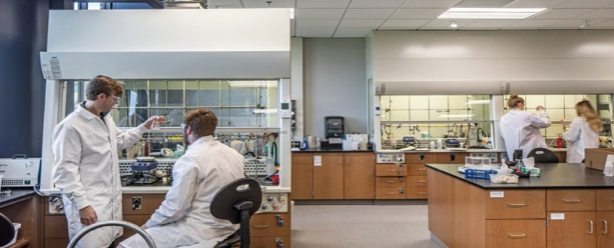
According to Oberley, “college students tend to be frugal with their time, money, and resources.” Since they draw conclusions to build awareness, conservation is not necessarily a challenge for them. When students experience a simulation of choice to preserve or deplete, they live with the results. Various purposeful and ecological projects have occurred. Members of several organizations in addition to Chemistry Club and the Navigator and Leadership program modeled cause/effect recycling efforts for a campus wide video.
Housekeeping, maintenance, cafeteria and technology staffs were congratulated for best practices: purchasing environmentally safe cleaning products, reducing chemical waste, recycling batteries, lowering energy consumption, resisting a disposable culture and other sustainable practices.
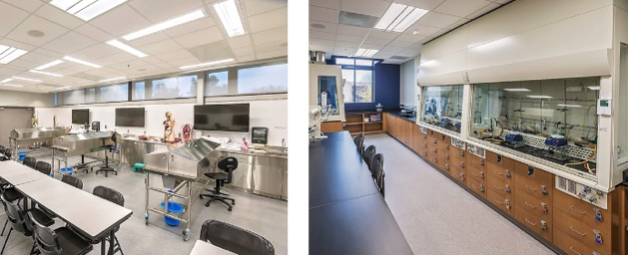
The Facing Forward campaign renovated Eck Hall with updated nursing and health science labs in addition to a new Bishop Gerber Science Center with state-of-the-art equipment, labs, offices and classrooms improving math and science departments. Energy-efficient lighting, insulation, air circulation and windows adorn this facility. Another campus enhancement included the preservation of memories, art and architecture of Sacred Heart Hall commemorating its 100 anniversary.
By focusing on solutions and removing politics, Oberley’s passion to preserve and protect the planet is evident in the university’s mission to graduate “students who are stewards not consumers.”
Jenny’s journey
Promoting diversity and inclusion was integral during Jenny Duong’s four years at Newman where she earned a biology degree and participated in Diversity Round Table, Student Government Association and Jazzy Jets. Investing in recycling throughout campus and providing reusable lunch trays for students living on campus were part of Duong’s college experience.
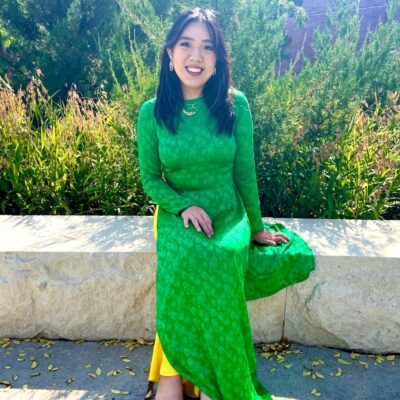
Duong joined the Neighborhood Cleanup, which is Wichita’s program helping the underserved communities discard trash including furniture, tires, clothing, or any unwanted items that may clutter dwellings or the streets. “This initiative reduces unwanted items from landfills and responsibly places them in the areas to be recycled or discarded correctly. I participated in the cleanup three times, and many Newman students have contributed to this effort.”
According to Duong, “my capstone project was called the Neighborhood Cleanup. … Dumpsters, trucks, and packers were provided by the city, and residents placed any unwanted items on the curb and volunteers collected them. This event was very beneficial, because it saved the residents, the elderly, disabled or those lacking a vehicle, time and money. … By relieving the people of these barriers, we can help the environment and help residents live in a safer and cleaner environment.”
“I was inspired to host this event when I joined my first neighborhood cleanup, when I was on the County Commissioner’s Citizens Advisory Board. I saw the amount of waste the residents brought and how much it helped them. Residents were grateful for the opportunity, and it really cleaned the area, making it look nicer.”
Introducing this concept to students opens a door for the university to encourage students to participate in society, help those in need, and preserve the environment. Students may not know how to live a sustainable lifestyle or where to begin. Volunteering is a great place to start; thus, opening possibilities for students is a great idea.”
“As president of Newman Circle K International, Ashley Dinh has worked relentlessly to convince the university to start recycling again. She has introduced various opportunities to Newman students to become more involved in the community.” Duong admires Dinh for her energy, efficiency, and environmental enthusiasm.
One of Newman University’s accomplishments is the Gardening Club that makes the campus greener and teaches people about plants, planting, tending a garden, and the ecosystem. Ideally, Duong hopes the campus will only purchase biodegradable products and encourage more resources for materials that do not burden society. A dedicated team, like the Neighborhood Cleanup, that picks up and properly discards items on a monthly basis is a sustainable goal. Her environmental efforts and her willingness to create informercials spark curiosity.
Earthly Emerson’s engagement
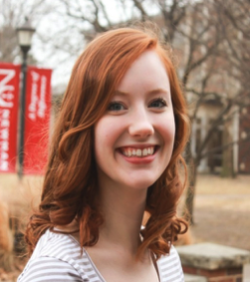
Sense of community and various leadership opportunities engaged Amy Emerson as she pursued degrees in English and communication. Participation in Recycling Club and Gardening Club, writing for the University Relations, an ASC Service Scholar, a classroom facilitator for T&T, team captain of the Sloppy Joe Improv Troupe and a performer in several plays, Emerson also attended the Multicultural Leadership Organization’s events, as well as other campus events. This 2019 Newman University graduate currently works full time at Newman as a digital content specialist and continues to build relationships with students, faculty and staff.
“Newman is protecting the planet by sharing inspirational quotes from Pope Francis’ encyclical, ‘Laudato Si'”‘ on social media and monitors around campus. Additionally, there is signage located with recycling totes to inform students, faculty and staff how to properly recycle. A freshman class also created a video of what not to recycle on campus.”
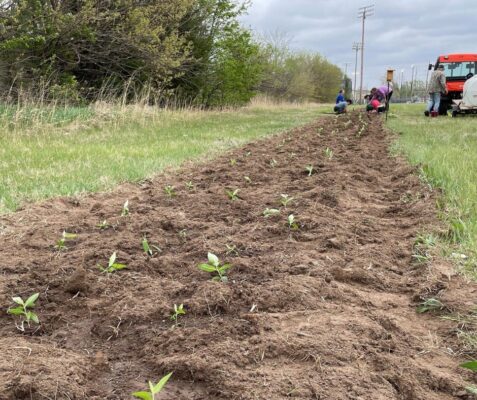
“Previous Earth Week events built more awareness about efforts in the greater Wichita community to be green-focused and Earth-minded. Grate Fill is a Wichita refill shop that sells several sustainable products to make ‘living green’ easier. ICT Food Rescue also works to reduce food insecurity by ‘rescuing’ food that would otherwise be thrown away and giving it to those in need.”
“Any effort to reduce waste and be more mindful of the health of the planet and every creature on it will benefit not only ourselves but also our future generations. Making small changes on a small campus can go a long way. With students graduating every year, it can be a challenge to continue the efforts started by students, because it involves handing the torch to the next set of leaders.”
Another environmentally “leave no trace” statement is apparent in the Mabee Dining Center’s decision to provides eco-friendly refill containers. Emerson imagines future goals may include a compost pile, a fresh garden or implementing more campus reducing, repurposing, recycling initiatives.
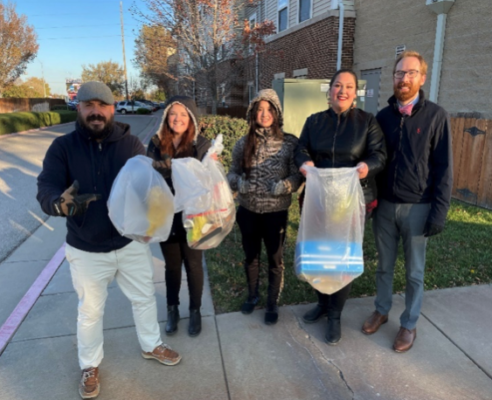
Emerson acknowledges associate professor of English Susan Crane-Laracuente, Ph.D., as a mentor and the Gardening Club advisor who engages students in Earth-friendly opportunities on campus and beyond. Students, faculty and staff are to be commended for campus cleanup efforts.
Gourds attracted purple martins; milkweed welcomed monarch butterflies; campus enhancements beautified and greeted pollinators. Father Tom Welk hosted Gardening Club planting milkweed events.
Father Welk stated, “we’re responsible for this beautiful planet God has created,” and from Genesis: ‘Here. I’m giving you all these gifts; Be good stewards;’ and unfortunately, in many ways we have not been very good stewards of God’s beautiful, bountiful blessings.”
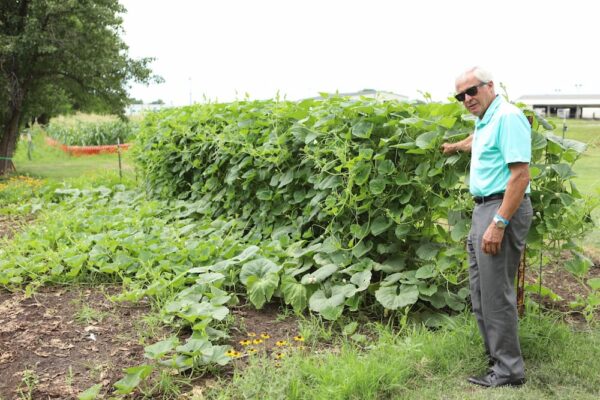
Jubilant Jets soar
Custodial Services Supervisor Scott Stardy has been a shining star encouraging a clean campus, providing support and modeling sustainable practices. His infusion of reducing, repurposing and recycling is admirable. Purchasing and promoting cleaning products that are environmentally safe demonstrates his commitment to the cleanse the campus landscape branding Newman University as integral part of Earth Day every day.
Mabee Dining Services Chef Clarke Wilson has baked as many delicacies as possible addressing “food for the soul and the mind” stretching dough and sprinkling yummy thoughtfulness daily.
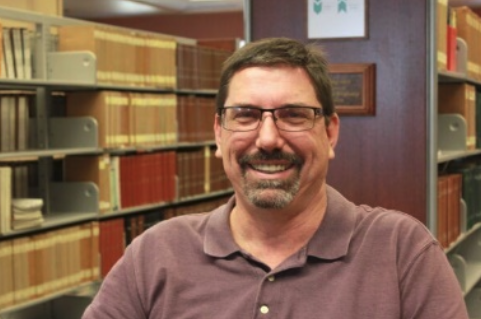
In the interest of students, Library Director Steve Hamersky supports campus recycling initiatives and extended hours providing students a “safe, cozy place” during finals week and throughout the semester with comfortable furniture, coffee, snacks and a wealth of academic resources.
“Leave things better than you found them,” fulfills alumna Samantha Radar’s heart for the Mabee Dining Services “eco-friendly” dishes. A graduate of Newman, the ASC community leadership scholar, Multicultural Leadership Organization, Gardening Club, cross-country team and biology teaching assistant, “Samantha Rader is always looking for the next challenge.”
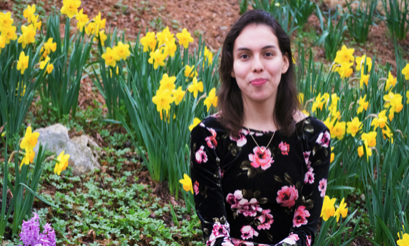
Exemplary information technology and computer systems are maintained by Chief Information Officer Icer Vaughan who ascends the Jets to the highest altitude. His flock supports students, faculty, and staff, recycles batteries and much more. They cool computers to reduce waste heat and provide greater productivity and efficiency maneuvering behind the scenes.
Praise to the unified efforts of these Jets and all those in the Newman galaxy shining a beam of hope.
Get to know the author
Carmaine Ternes is a retired Emporia High School Librarian who has served on numerous committees and actively holds membership with several professional organizations. She earned a Master’s Degree in Library Science from Emporia State University. Contributing to the publication “Libraries Partnering with Self-Publishing: A Winning Combination” by Robert J. Grover, Kelly Visnak, Miranda Ericsson, Lissa Staley and Ternes help patrons create, produce and market their own books utilizing library resources. Attending the Kansas Leadership Center trainings: Your Leadership Edge, Lead for Change, and Equip to Lead provided valuable connections and learning opportunities. Ternes participated in StoryCorps One Small Step Wichita and has completed Climate Stories Ambassadors Project demonstrating her passion for preserving the planet.
Walking, reading, writing, editing, and volunteering reward Ternes’ days.
Ternes is a member of St. Thomas Aquinas Parish in Wichita and St. Vincent DePaul’s Walking with Purpose in Andover.
Ternes is blessed to be married to her husband Steve for forty years. They have a son, Brock, and daughter, Stephanie, who is married to Dominik King. Granddaughters Cameron and Carter provide joy and laughter.
View 2023 Earth Week events
Newman University is excited to host its second annual Earth Week as part of its seven-year Laudato Si’ commitment.
